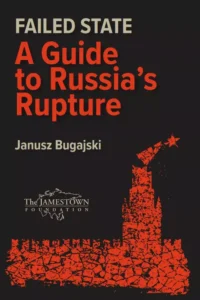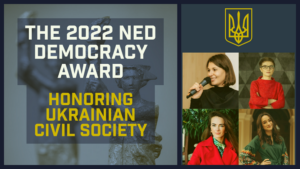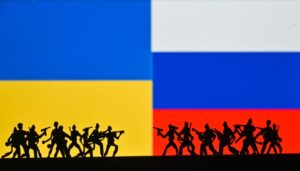With its courage in battle, Ukraine is rewriting the history of the 21st century. In stopping a dictator’s brazen invasion, it has become a symbol of the values that the West cherishes, The Washington Post’s David Ignatius observes.
“Nothing succeeds like success,” said François Heisbourg, a French defense analyst. “It’s important to be able to demonstrate that what we’re doing over the last months leads to positive outcomes,” he said of Ukraine’s Western supporters, The Times reports:
Those who favor strong sanctions against Russia “have been hard-pressed to prove that anything good was happening to our side and that the Russians weren’t laughing all the way to the bank without having to relinquish any of their ill-gotten gains,” Heisbourg said. “But now it’s up to those who think sanctions are failing to prove that Russia is not hurting, because it is,” he added. “And I think there will be a new willingness to provide aid to Ukraine.”
 The Ukrainians, using a combination of clever strategy, military fortitude, and Western weapons, have routed the Russians from a series of positions around Kharkiv. These were not merely defeats; the Russians were abandoning their posts and leaving behind their equipment even before the Ukrainians could reach them, The Atlantic reports:
The Ukrainians, using a combination of clever strategy, military fortitude, and Western weapons, have routed the Russians from a series of positions around Kharkiv. These were not merely defeats; the Russians were abandoning their posts and leaving behind their equipment even before the Ukrainians could reach them, The Atlantic reports:
Evidently, Russian soldiers do not want to die for President Vladimir Putin’s pathetic dream of reestablishing a state that had already perished before some of them were even born. This is an immense humiliation for the Russians and for Putin personally, and Russian pundits are already yelling at one another in panic on state television. The Russian state’s newspaper of record, Rossiskaya Gazeta, is, as the analyst Mark Galeotti noted, stammering and contradicting itself trying to wave away yet another Russian military disaster.
The West’s sanctions against Russia will retard the country’s economic growth for decades to come, said Michael McFaul, Director of Stanford University’s Freeman Spogli Institute for International Studies.
 “The Russian economy will weaken and will not be able to recover quickly. Thousands of international companies have left Russia, the economic impact will be catastrophic,” he told the 17th Yalta European Strategy (YES) forum, “Ukraine: Defending All Our Freedom”, organized in partnership with the Victor Pinchuk Foundation. The sanctions are intended to stop the invasion, not to provoke regime change, McFaul insisted.
“The Russian economy will weaken and will not be able to recover quickly. Thousands of international companies have left Russia, the economic impact will be catastrophic,” he told the 17th Yalta European Strategy (YES) forum, “Ukraine: Defending All Our Freedom”, organized in partnership with the Victor Pinchuk Foundation. The sanctions are intended to stop the invasion, not to provoke regime change, McFaul insisted.
“There is an opinion that the sanctions will hit the oligarchs, the oligarchs will hit Putin and say: ‘Volodya, we must stop the war.’ This is a naive opinion on how sanctions work in an authoritarian system,” he added. “However, the rationale behind sanctions is to make Russia pay for the war in economic terms, and here we see progress.”
 Small cracks have appeared in the Russian political system, but they are not sufficient to change the political calculations related to the war, notes Gwendolyn Sasse, director of the Centre for East European and International Studies (ZOiS) in Berlin. At the same time, one should not forget that authoritarianism can look stable for a long time until all of a sudden change occurs.
Small cracks have appeared in the Russian political system, but they are not sufficient to change the political calculations related to the war, notes Gwendolyn Sasse, director of the Centre for East European and International Studies (ZOiS) in Berlin. At the same time, one should not forget that authoritarianism can look stable for a long time until all of a sudden change occurs.
This change, however, does not only come in the form of democratization, she writes for Carnegie Europe. Based on repression, pervasive state propaganda, and a loyalty-based relationships among the political, security, and economic elites, the Russian political system has become even more autocratic in recent months.
Two key elements of the incredible resilience and creativity of Ukraine’s resistance to the Russian invasion are the country’s longstanding network of independent civil society organizations and its tradition of volunteerism. Notably, many of these organizations have long been led by women, the Carnegie Endowment adds. Join former U.S. ambassador to Ukraine and Carnegie senior fellow Marie Yovanovitch for a timely conversation (above) with four leading civil society figures, including partners of the National Endowment for Democracy (NED).
 September 15, 2022. 1:00 PM—2:00 PM EDT (UTC-4)
September 15, 2022. 1:00 PM—2:00 PM EDT (UTC-4)Speakers:
- Yuliya “Taira” Paievska is a celebrated military medic who chronicled her experiences in Mariupol using a body camera and was held captive by Russian forces for three months earlier this year.
- Olena Halushka is a board member of the Anti-Corruption Action Center (ANTAC) and the co-founder of the International Center for Ukrainian Victory.
- Hanna Hopko is the former chair of the Committee on Foreign Affairs in the Ukrainian Verkhovna Rada. She is now the chairwoman of ANTS, a civil society organization, and the co-founder of the International Center for Ukrainian Victory.
- Alyona Getmanchuk is the founder and director of the New Europe Center, a Kyiv-based foreign policy and national security think tank.
- Marie Yovanovitch is a senior fellow in the Russia and Eurasia Program at the Carnegie Endowment for International Peace. RSVP

Credit: ACUS
Russian Volunteers who’ve Fought in Ukraine Feel Betrayed, Putting New Pressure on the Kremlin to Declare Mobilization, analyst Paul Goble adds:
- Moscow Seeks to Suppress Ukraine Lest It Again Trigger Decolonization and Disintegration
- Even Some who Continue to Work for Russian Government Find Ways to Protest Putin’s War
- Pay More than Patriotism Is Behind Russians’ Willingness to Fight in Ukraine







